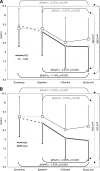Incremental value of continuous glucose monitoring when starting pump therapy in patients with poorly controlled type 1 diabetes: the RealTrend study
- PMID: 19767384
- PMCID: PMC2782985
- DOI: 10.2337/dc09-0750
Incremental value of continuous glucose monitoring when starting pump therapy in patients with poorly controlled type 1 diabetes: the RealTrend study
Abstract
Objective: To compare the improvements in glycemic control associated with transitioning to insulin pump therapy in patients using continuous glucose monitoring versus standard blood glucose self-monitoring.
Research design and methods: The RealTrend study was a 6-month, randomized, parallel-group, two-arm, open-label study of 132 adults and children with uncontrolled type 1 diabetes (A1C >or=8%) being treated with multiple daily injections. One group was fitted with the Medtronic MiniMed Paradigm REAL-Time system (PRT group), an insulin pump with integrated continuous subcutaneous glucose monitoring (CGM) capability, with instructions to wear CGM sensors at least 70% of the time. Conventional insulin pump therapy was initiated in the other group (continuous subcutaneous insulin infusion [CSII] group). Outcome measures included A1C and glycemic variability.
Results: A total of 115 patients completed the study. Between baseline and trial end, A1C improved significantly in both groups (PRT group -0.81 +/- 1.09%, P < 0.001; CSII group -0.57 +/- 0.94%, P < 0.001), with no significant difference between groups. When the 91 patients who were fully protocol-compliant (including CGM sensor wear >or=70% of the time) were considered, A1C improvement was significantly greater in the PRT group (P = 0.004) (PRT group -0.96 +/- 0.93%, P < 0.001; CSII group -0.55 +/- 0.93%, P < 0.001). Hyperglycemia parameters decreased in line with improvements in A1C with no impact on hypoglycemia.
Conclusions: CGM-enabled insulin pump therapy improves glycemia more than conventional pump therapy during the first 6 months of pump use in patients who wear CGM sensors at least 70% of the time.
Trial registration: ClinicalTrials.gov NCT00441129.
Figures

References
-
- Diabetes Control and Complications Trial Research Group. The effect of intensive treatment of diabetes on the development and progression of long-term complications in insulin-dependent diabetes mellitus. N Engl J Med 1993; 329: 977– 986 - PubMed
-
- Diabetes Control and Complications Trial Research Group. Implementation of treatment protocols in the Diabetes Control and Complications Trial. Diabetes Care 1995; 18: 361– 376 - PubMed
-
- Bruttomesso D, Crazzolara D, Maran A, Costa S, Dal Pos M, Girelli A, Lepore G, Aragona M, Iori E, Valentini U, Del Prato S, Tiengo A, Buhr A, Trevisan R, Baritussio A: In type 1 diabetic patients with good glycaemic control, blood glucose variability is lower during continuous subcutaneous insulin infusion than during multiple daily injections with insulin glargine. Diabet Med 2008; 25: 326– 332 - PubMed
-
- Doyle EA, Weinzimer SA, Steffen AT, Ahern JA, Vincent M, Tamborlane WV: A randomized, prospective trial comparing the efficacy of continuous subcutaneous insulin infusion with multiple daily injections using insulin glargine. Diabetes Care 2004; 27: 1554– 1558 - PubMed
-
- Pickup JC, Renard E: Long-acting insulin analogs versus insulin pump therapy for the treatment of type 1 and type 2 diabetes. Diabetes Care 2008; 31: S140– S145 - PubMed
Publication types
MeSH terms
Substances
Associated data
LinkOut - more resources
Full Text Sources
Other Literature Sources
Medical

